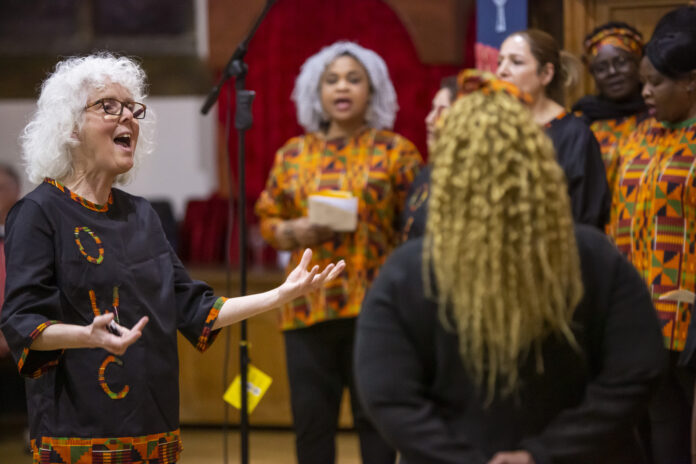“Everyone can sing!” rang out from the stage of the Albert Hall in 1963. Pete Seeger was on his world tour and, having been influenced by him and The Weavers from my teens, singing many of their songs, I was absolutely willing to go along with this assertion.
In 1975 I had been singing professionally for over ten years when I started running voice workshops. By then I had got to know folk song collectors such as A L Lloyd, Ewan MacColl and Kenny Goldstein. They confirmed the idea that singing had been a fully inclusive activity for thousands of years.
I think this made a great difference to the way I facilitated my workshops and singing groups. I was determined to provide a place where anybody, regardless of past experience, could come and simply enjoy voicing and singing with others without judgment or criticism. If you trust that there is a voice inside everyone which may or may not have been encouraged to make itself heard, then that belief in turn inspires the confidence and courage of the participants.
In 1977 I ran my first training weekend and took on my first “apprentices”. “But you’ll do yourself out of a job”, I recall somebody saying. I replied I’d have to take the risk, but if it was true that there were thousands of people who would love the opportunity to sing in an accepting atmosphere, and find themselves able to make beautiful harmonies and gain in confidence, it was a risk I was willing to take!
Since 1988, I’ve run week-long courses for people wanting to run voice and singing groups, assisted by my partner Darien Pritchard, who teaches movement, relaxation and anatomy.
Central to the way NVN members have grown to define ourselves is the folk and world music background many of us share. Recent research suggests that humans have been singing for at least 50,000 years. We know that our ancestors sang. Singing was an inclusive activity for all these thousands of years and in Northern Europe only began to turn into an “exclusive” activity primarily in the 19th century. The singing of the “common people” in church and on formal occasions was actively discouraged by the new gentility who referred to their sounds as “vulgar” and desired only the sweet sounds acceptable to the aspiring middle classes. As one of our Network members summed up: “A cultural injustice was perpetrated on the British during the 19th century which effectively robbed a large number of people of their hitherto held belief in their ability and right to sing.”
So we see it as a social, cultural and politically empowering act to encourage and to bring back singing as a natural communal activity.
We are a broad movement with many different genres of music being taught and with an increasing number of members composing for their and others’ choirs. However we all hold to the knowledge that singing creates a sense of individual wellbeing, brings communities together and gives us the opportunity to create sounds of power and beauty.
I am proud and privileged to have been one of the pioneers of such a movement.
Thank you.

